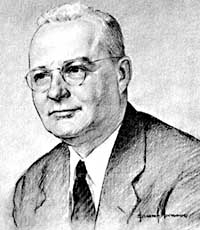Midgley, Jr., Thomas
Thomas Midgley, Jr. (1889–1944), an American mechanical engineer and chemist who developed both the tetraethyl lead additive for gasoline in 1921 and chlorofluorocarbons (CFCs) in 1930. While working for General Motors (GM), he discovered that leaded-gasoline prevented internal combustion engines from "knocking.” This discovery, and the introduction of lead additives to gasoline, enabled airplane makers to develop more powerful engines, giving the U.S. a decisive advantage during World War II. The increased engine horsepower also allowed for greater aircraft safety, reliability, and speed. However, it was eventually shown that the lead added to gasoline was released to the environment, thereby creating the potential for risk to human health. Despite this knowledge, it wasn't until the 1970's that lead pollution concerns resulted in a ban on lead compounds in gasoline and the introduction of less toxic anti-knock additives.
In 1930, Midgley was charged to find an inexpensive, nontoxic refrigerant for use in household appliances for General Motors—he discovered Freon, a CFC. This chemical revolutionized refrigeration technology and enabled the development of modern air conditioning technology. However, in the 1980s, CFCs were identified as the cause of the depletion of the Earth’s protective ozone layer, and were banned in most nations. Thus, while lauded at the time for his discoveries, Midgley's legacy is seen today as far more mixed. One historian remarked that Midgley "had more impact on the atmosphere than any other single organism in the Earth’s history."
